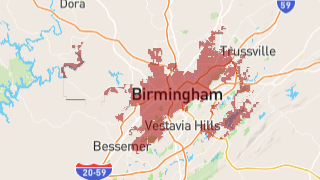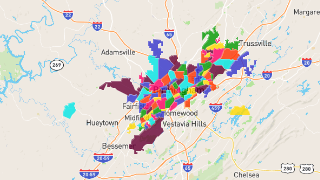Birmingham
Maps and Statistics of Birmingham
Birmingham is the largest city in Alabama and serves as a major hub in the southeastern United States. Established in 1871 during the post-Civil War Reconstruction era, Birmingham rapidly grew due to its abundance of iron ore, coal, and limestone, which are essential for steel production. This led to Birmingham's nickname, "The Magic City," reflecting its rapid growth.
The city played a pivotal role in the Civil Rights Movement during the 1960s. Notably, events such as the Birmingham campaign and the tragic bombing of the 16th Street Baptist Church brought international attention to the struggles for racial equality. Today, its Civil Rights District includes landmarks like the Birmingham Civil Rights Institute and Kelly Ingram Park.
Economically, Birmingham has diversified beyond manufacturing to include sectors such as healthcare, finance, and technology. The University of Alabama at Birmingham (UAB) is one of the city's largest employers, renowned for its medical research and hospital. With a vibrant arts scene, rich history, and cultural diversity, Birmingham remains a dynamic city in the heart of Alabama.
Basic Info
| Population | 200,733 |
|---|---|
| Area | 387.505 km2 |

